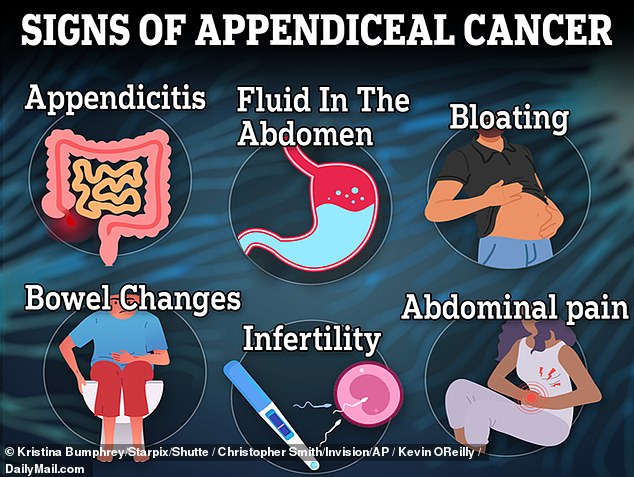Six little-known warning signs of rare appendiceal cancer that killed X-Men actor Adan Canto at age 42
Doctors are warning of the easily overlooked signs of appendiceal cancer following the death of actor Adan Canto.
The Latino actor died Monday at the age of 42 after a private battle with the rare but fast-growing form of the disease.
Canto was best known for his roles as Vice President-elect Aaron Shore opposite Kiefer Sutherland in Designated Survivor and as Sunspot in X-Men: Days of Future Past.
Appendiceal cancer is rare: Fewer than 1,000 cases are diagnosed in the U.S. each year—about one to three per million people.
However, studies show the disease is becoming increasingly common, with rates among people under 50 rising by more than 200 percent in the past two decades.
Doctors aren’t sure what’s behind the increase, but they have noted that it is similar to the unexplained increase in colon cancer in young people.

Adan Canto, pictured above in 2016 as he competed in a triathalon in Malibu, California, died at age 42 from appendiceal cancer after a private battle with the disease


The above image shows the symptoms of appendix cancer. Doctors discover a mysterious increase in the number of cases of the disease
In addition to its rarity, a challenge in diagnosing appendiceal cancer is that its symptoms can easily be dismissed as more common conditions.
This increases the risk that the disease will not be diagnosed until a later stage, when it is more difficult to treat.
Here are the most common symptoms of appendiceal cancer:
Appendicitis
Appendicitis is the inflammation of the appendix – a small finger-shaped sac at the end of the large intestine.
Doctors are unsure about the function of the appendix. Some experts say it can act as a repository for good bacteria, while others label it an evolutionary relic from a time when human ancestors ate more plants.
Appendicitis is usually caused by a blockage in the lining of the organ, as well as infections.
This leads to sudden and severe pain around the navel that moves to the lower right side of the abdomen. This pain can worsen when coughing, walking or making other fast movements.
According to the Mayo Clinic, other signs of appendicitis include nausea, vomiting, loss of appetite, low-grade fever, constipation, diarrhea, bloating and gas.
If left untreated, the appendix can burst. The only treatment for appendicitis is to remove the appendix, but the cancer remains if it has spread to other organs.
Fluid in the abdomen


Canto is survived by his wife, Stephanie Ann Canto, and their two young children, Roman Alder, three, and Eve Josephine, one.


Canto was known for roles in the show Designated Survivor and the 2014 film X-Men: Days of Future Past
As appendiceal cancer spreads, it can lead to a buildup of fluid in the abdomen.
This is also called ascites and occurs between two layers in the peritoneum, a tissue layer that protects the stomach, intestines, liver and kidneys.
Ascites leads to a distended or swollen abdomen.
In addition to appendiceal cancer, ascites can also be caused by heart failure, kidney failure, infection or cirrhosis (scarring) in the liver.
According to the Cleveland Clinic, additional signs of ascites include swelling of the ankles, shortness of breath, abdominal pain, back pain, difficulty sitting and fatigue.
Bloated feeling
Bloating is one of the most common symptoms of appendiceal cancer – and one of the most overlooked.
Bloating causes the abdomen to feel full and tight due to a build-up of gas in the stomach and intestines.
More common causes of bloating include constipation, gastrointestinal disorders such as irritable bowel syndrome (IBS), and overeating.
Because it can be linked to so many more common conditions, bloating sufferers can be misdiagnosed.
Bowel changes
As tumors grow, they can lead to blockages in the body and discomfort.
These changes can lead to digestive problems such as constipation, diarrhea and changes in stool consistency.
The number of times you go to the toilet can also change, as can the color of the stool.
It is unclear whether appendiceal cancer leads to one type of intestinal change versus another.
However, problems such as constipation and diarrhea can be mistaken for more common conditions such as IBS, food intolerance and infections.
Infertility
According to the American Society of Clinical Oncology (ASCO), infertility can be a sign of appendiceal cancer.
Other cancers can also affect fertility by disrupting hormone production and damaging the reproductive organs.
The most common form of appendiceal cancer is neuroendocrine appendiceal cancer, which grows from enterochromaffin cells – these are involved in digestion and intestinal movement.
Neuroendocrine tumors disrupt hormone-producing cells, which can lead to infertility.
This can be especially alarming for young patients, among whom cases of appendiceal cancer are increasing as fertility rates in the US continue to decline.
Stomach ache
Abdominal pain is another often overlooked sign of appendiceal cancer.
This type of pain can occur anywhere between the chest and the groin, although it most often involves pain in the stomach area.
As with bowel changes and bloating, abdominal pain can be mistaken for more common conditions such as constipation and food intolerances.
In appendiceal cancer, this pain can also radiate to the pelvic area.
